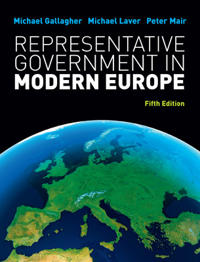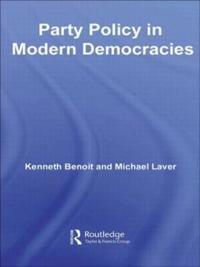Representative Government in Modern Europe (Häftad)
avMichael Gallagher, Michael Laver, Peter Mair
ISBN: 9780077129675 - UTGIVEN: 201103With a total population of some 500 million, the unified countries of modern Europe constitute the world's largest collection of successful capitalist democracies. Yet within it, there are distinct clusters of states, each with its own characteristics, historical allegiances and political processes.[...]
Party Policy in Modern Democracies (Häftad)
avBenoit Kenneth, Kenneth Benoit, Michael Laver
ISBN: 9780415499798 - UTGIVEN: 200902A new and wide-ranging empirical overview of party policy in 47 modern democracies, including all of the new democracies of Eastern Europe. It updates and radically extends Policy and Party Competition (1992), which established itself as a key mainstream data source for all political scientists expl[...]
Multiparty Democracy (Häftad)
avMichael Laver, Norman Schofield, Itai Sened
ISBN: 9780521456586 - UTGIVEN: 200607This book adapts a formal model of elections and legislative politics to study party politics in Israel, Italy, the Netherlands, Britain, and the United States. The approach uses the idea of valence, that is, the party leader's non-policy electoral popularity, and employs survey data to model these [...]
Party Competition: An Agent-Based Model (Övrig)
avMichael Laver, Ernest Sergenti
ISBN: 9780691139043 - UTGIVEN: 2011-10-10Party competition for votes in free and fair elections involves complex interactions by multiple actors in political landscapes that are continuously evolving, yet classical theoretical approaches to the subject leave many important questions unanswered. Here Michael Laver and Ernest Sergenti offer [...]






